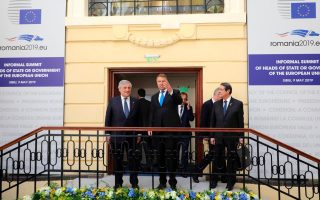Greece responds strongly to Turkish statement on Aegean islands

Greece’s foreign ministry has responded strongly to a claim by its Turkish counterpart that Greece wants to drag NATO into a dispute between itself and Turkey.
Earlier Sunday, Turkish Foreign Ministry spokesman Hami Aksoy denounced “the attempts of Greece, our neighbour and Ally, to abuse international organizations, including NATO, and draw them into these disputes with the aim of justifying her national positions,” adding they are not new.
Aksoy reiterated Turkey’s current position that “(t)he Eastern Aegean islands were put under demilitarized status by virtue of several international agreements, including the Treaty of Lausanne of 1923 and the Treaty of Paris of 1947” and that, therefore, “the military vessels operating in the Aegean Sea under the NATO Activity would refrain from visiting the Aegean islands under demilitarized status according to international law, including with the aim of refuelling or port visits.” Violating these conditions, Aksoy said, would also violate “the Alliance’s policy of refraining from involvement in bilateral disputes between Allies.”
In response, Greek Foreign Affairs Ministry spokesman Alexandros Gennimatas said that “such unacceptable and unfounded claims against Greece undermine the stability of the area and the cohesion of the Alliance. Similar claims have absolutely no footing in international law and have been answered appropriately and repeatedly.”
The rest of the statement is as follows:
“We remind Turkey that the legal status of the Aegean has been expressly and unquestionably clarified by the 1923 Treaty of Lausanne and the 1947 Treaty of Paris. The latter, however, grants no rights to Turkey, as it is not one of the counterparties.
Besides, on the basis of the provisions of United Nations' Charter, Greece will never give up its right to take appropriate measures to legally defend and protect its sovereignty and territorial integrity.
Furthermore, Turkey is putting forward equally unfounded claims as to the institutional operation of NATO and the carrying out of its operations in the Aegean, which it obstructs unjustifiably.
We call upon Turkey to respect its obligations that stem from Article 1 of the Treaty of Washington and Article 2(4) of the UN Charter, and to fully abstain from any threat of use of violence or illegal unilateral actions. The key condition for stability in our turbulent area is strict implementation of international law and the law of the sea, as it applies and not as Turkey wishes to arbitrarily interpret, unique in the world.
Only in this context can honest dialogue take place.”
The Treaty of Lausanne, indeed, provided for the demilitarization of the Greek islands of Lemnos and Samothraki, which lie closest to the Dardanelles Strait. The same treaty demilitarized the Dardanelles Strait and two Turkish islands close to it.
The Treaty of Montreux signed in 1936, 13 years after that of Lausanne, explicitly gave Turkey the right to remilitarize this zone. It did not explicitly give Greece the same right _ no one knows why _ but Turkey, at the time, explicitly and officially recognized that the same provision applied to the two Greek islands.
The Greek islands of Lesvos, Chios, Samos and Ikaria were partly demilitarized by the Treaty of Lausanne. But the treaty allowed Greece to maintain “the usual number” of forces “to ensure peace.” The partial demilitarization essentially limited the type of military infrastructure allowed on the islands: Greece could not a maintain a naval base or erect fortifications.
The Treaty of Paris, in 1947, was signed between 20 World War II allies and Italy. It was the one that gave the Dodecanese islands to Greece. It provided for the demilitarization of the Dodecanese. Greece’s interpretation is that this clause bound it against the other Treaty signatories but not vis-a-vis Turkey, which was not a party to the Treaty.





